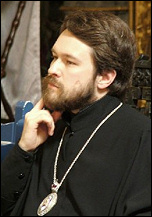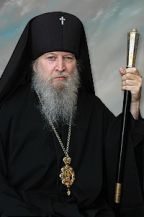On Women's Ordination
Fr. Alexander Schmemann
A letter written by Orthodox priest Fr. Alexander Schmemann
Dear Friend:
When you asked me to outline the Orthodox reaction to the idea of women's ordination to the priesthood, I thought at first that to do so would not be too difficult. It is not difficult, indeed, simply to state that the Orthodox Church is against women's priesthood and to enumerate as fully as possible the dogmatical, canonical, and spiritual reasons for that opposition.
On second thought, however, I became convinced that such an answer would be not only useless, but even harmful. Useless, because all such "formal reasons" - scriptural, traditional, canonical - are well known to the advocates of women's ordination, as is also well known our general ecclesiological stand which, depending on their mood and current priorities, our Western Brothers either hail as Orthodoxy's "main" ecumenical contribution or dismiss as archaic, narrow-minded, and irrelevant. Harmful, because true formally, this answer would still vitiate the real Orthodox position by reducing it to a theological context and perspective, alien to the Orthodox mind. For the Orthodox Church has never faced this question, it is for us totally extrinsic, a casus irrealis for which we find no basis, no terms of reference in our Tradition, in the very experience of the Church, and for the discussion of which we are therefore simply not prepared.
Such is then my difficulty. I cannot discuss the problem itself because to do so would necessitate the elucidation of our approach - not to women and to priesthood only - but, above all to God in his Triune Life, to Creation, Fall and Redemption, to the Church and the mystery of her life, to the deification of man and the consummation of all things in Christ. Short of all this it would remain incomprehensible, I am sure, why the ordination of women to priesthood is tantamount for us to a radical and irreparable mutilation of the entire faith, the rejection of the whole Scripture, and, needless to say, the end of all "dialogues." Short of all this my answer will sound like another "conservative" and "traditional" defense of the status quo, of precisely that which many Christians today, having heard it too many times, reject as hypocrisy, lack of openness to God's will, blindness to the world, etc. Obviously enough those who reject Tradition would not listen once more to an argument ex traditione....
But to what will they listen? Our amazement - and the Orthodox reaction is above all that of amazement - is precisely about the change and, to us, incomprehensible hastiness with which the question of women's ordination was, first, accepted as an issue, then quickly reduced to the level of a disciplinary "matter" and finally identified as an issue of policy to be dealt with by a vote! In this strange situation all I can do is to try to convey to you this amazement by briefly enumerating its main "components" as I see and understand them.
The first dimension of our amazement can be termed "ecumenical." The debate on women's ordination reveals something which we have suspected for a long time but which now is confirmed beyond any doubt: the total truly built-in indifference of the Christian West to anything beyond the sphere of its own problematics, of its own experience. I can only repeat here what I have said before: even the so-called "ecumenical movement," notwithstanding its claims to the contrary, has always been, and still is, a purely Western phenomenon, based on Western presuppositions and determined by a specifically Western agenda. This is not "pride" or "arrogance." On the contrary, the Christian West is almost obsessed with a guilt complex and enjoys nothing better than self-criticism and self condemnation. It is rather a total inability to transcend itself, to accept the simple idea that its own experience, problems, thought forms and priorities may not be universal, that they themselves may need to be evaluated and judged in the light of a truly universal, truly "Catholic" experience. Western Christians would almost enthusiastically judge and condemn themselves, but on their own terms, within their own hopelessly "Western" perspective. Thus when they decide -- on the basis of their own possibly limited and fragmented, specifically Western, "cultural situation" -- that they must "repair" injustices made to women, they plan to do it immediately without even asking what the "others" may think about it, and are sincerely amazed and even saddened by lack, on the part of these "others" of ecumenical spirit, sympathy and comprehension.
Personally, I have often enough criticized the historical limitations of the Orthodox mentality not to have the right to say in all sincerity that to me the debate on women's ordination seems to be provincial, deeply marked, and even determined by Western self-centeredness and self-sufficiency, by a naive, almost childish, conviction that every "trend" in the Western culture justifies a radical rethinking of the entire Christian tradition. How many such "trends" we have witnessed during the last decades of our troubled century! How many corresponding "theologies"! The difference this time, however, is that one deals in this particular debate not with a passing intellectual and academic "fad" like "death of God," "secular city," "celebration of life," etc.-- which, after it has produced a couple of ephemeral best-sellers, simply disappears, but with the threat of an irreversible and irreparable act which, if it becomes reality, will produce a new, and this time, I am convinced, final division among Christians, and will signify, at least for the Orthodox, the end of all dialogues.
It is well known that the advocates of women's ordination explain the Scriptural and the traditional exclusion of women from ministry by "cultural conditioning." If Christ did not include women into the Twelve, if the Church for centuries did not include them into priesthood, it is because of "culture" which would have made it impossible and unthinkable then. It is not my purpose to discuss here the theological and exegetical implications of this view as well as its purely historical basis, which incidentally seems to me extremely weak and shaky; what is truly amazing is that while absolutely convinced that they understand past "cultures," the advocates of women's ordination seem to be totally unaware of their own cultural "conditioning" of their own surrender to culture.
How else can one explain their readiness to accept what may prove to be a passing phenomenon and what, at any rate, is a phenomenon barely at its beginning (not to speak of the women's liberation movement, which at present is nothing but search and experimentation) as a sufficient justification for a radical change in the very structure of the Church?
How else, furthermore, are we to explain that this movement is accepted on its own terms, within the perspective of "rights", "justice," "equality," Etc. -- all categories whose ability adequately to express the Christian faith and to be applied as such within the Church is, to say the least, questionable?
The sad truth is that the very idea of women's ordination, as it is presented and discussed today, is the result of too many confusions and reductions. If its root is surrender to "culture", its pattern of development is shaped by a surrender to "clericalism." It is indeed almost entirely dominated by the old "clerical" view of the Church and the double "reduction" interest in it. The reduction on the one hand, of the Church to a "power structure," the reduction on the other hand, of that power structure to clergy. To the alleged "inferiority" of women within the secular power structure, corresponds their "inferiority," i.e., their exclusion from clergy, within the ecclesiastical power structure. To their "liberation" in the secular society must therefore correspond their "liberation," i.e., ordination, in the Church.
But the Church simply cannot be reduced to these categories. As long as we try to measure the ineffable mystery of her life by concepts and ideas a priori alien to her very essence, we entirely mutilate her, and her real power, her glory and beauty, and her transcendent truth simply escape us.
That is why in conclusion of this letter I can only confess, without explaining and justifying this confession by my "proofs." I can confess that the non-ordination of women to priesthood has nothing, absolutely nothing, to do with whatever "inferiority" we can invent or imagine. In the essential reality which alone constitutes the content of our faith and shapes the entire life of the Church, in the reality of the Kingdom of God which is perfect communion, perfect knowledge, perfect love, and ultimately the "deification" of man, there is truly "neither male nor female." More than that, in this reality, of which we are made partakers here and now, we all, men and women, without any distinction, are "Kings and priests," for it is the essential priesthood of the human nature and vocation that Christ has restored to us.
It is of this priestly life, it is of this ultimate reality, that the Church is both gift and acceptance. And that she may be this, that she may always and everywhere be the gift of the Spirit without any measure or limitations, the Son of God offered himself in a unique sacrifice, and made this unique sacrifice and this unique priesthood the very foundation, indeed the very "form" of the Church.
This priesthood is Christ's, not ours. None of us, man or woman, has any "right" to it; it is emphatically not one of human vocations, analogous, even if superior, to all others. The priest in the Church is not "another" priest, and the sacrifice he offers is not "another" sacrifice. It is forever and only Christ's priesthood and Christ's sacrifice -- for, in the words of our Prayers of Offertory, it is "Thou who offerest and Thou who art offered, it is Thou who receivest and Thou who distributest...." And thus the "institutional" priest in the Church has no "ontology" of his own. It exists only to make Christ himself present, to make this unique Priesthood and this unique Sacrifice the source of the Church's life and the "acquisition" by men of the Holy Spirit. And if the bearer, the icon and the fulfiller of that unique priesthood, is man and not woman, it is because Christ is man and not woman...
Why? This of course is the only important, the only relevant question. The one precisely that no "culture," no "sociology," no "history," and even no "exegesis" can answer. For it can be answered only by theology in the primordial and essential meaning of that word in the Church; as the contemplation and vision of the Truth itself, as communion with the uncreated Divine Light. It is only here, in this purified and restored vision that we might begin to understand why the ineffable mystery of the relationship between God and His Creation, between God and His chosen people, between God and His Church, are "essentially" revealed to us as a nuptial mystery, as fulfillment of a mystical marriage. Why in other terms, Creation itself, the Church herself, man and the world themselves, when contemplated in their ultimate truth and destiny, are revealed to us as Bride, as Woman clothed in sun; why in the very depth of her love and knowledge, of her joy and communion, the Church identifies herself with one Woman, whom she exalts as "more honorable than the Cherubim, and beyond compare more glorious than the Seraphim."
Is it this mystery that has to be "understood" by means of our broken and fallen world, which knows and experiences itself only in its brokenness and fragmentation, its tensions and dichotomies and which, as such, is incapable of the ultimate vision? Or is it this vision and this unique experience that must again become to us the "means" of our understanding of the world, the starting point and the very possibility of a truly Divine victory over all that in this world is but human, historical and cultural?
(Bold is mine)
About the Author
The late Rt. Rev. Dr. Alexander Schmemann, S.T.D., LL.D, D.D., was Dean of St. Vladimir's Orthodox Theological Seminary in Crestweed, New York, where he also occupied the chair of Liturgical and Pastoral Theology.
Born in Estonia, he received his education in Paris. After completing his Baccalaureate in Philosophy, he graduated from the St. Sergius Theological Institute in 1945 and in the same year was appointed to the Institute's Faculty as Lecturer in Church History.
In 1951 he joined St. Vladimir's Theological Seminary as Professor of Liturgical Theology. In 1962 he was appointed Dean of the Seminary. In 1959 he was granted the degree of Doctor of Theology. Since 1958 he has been Adjunct Professor at the Graduate Faculty of Columbia University and was Lecturer in Eastern Orthodoxy at Union Theological Seminary.
He was a former member of the Faith and Order Commission of the World Council of Churches and attended the assemblies of Amsterdam, Lune, Evanston, Oberlin and Montreal. He was a member of the Study and Planning Committee of the Standing Conference of the Orthodox Bishops in America, of the Metropolitan Council of the Orthodox Church in America, and of the American Theological Society.
His publications in English included: The Historical Road of Eastern Orthodoxy (1963), Sacraments and Orthodoxy (1965), The Ultimate Questions (1965), Introduction to Liturgical Theology (1966), and Great Lent (1969).
He was also a member of the editorial boards of the Journal of Ecumenical Studies and Worship.
Because of his learning, wit, and personal warmth, he had been a very popular lecturer at the General Theological Seminary, which awarded him an honorary degree.
Thanks to Source:
http://www.orthodoxytoday.org/articles6/SchmemannOrdination.php



